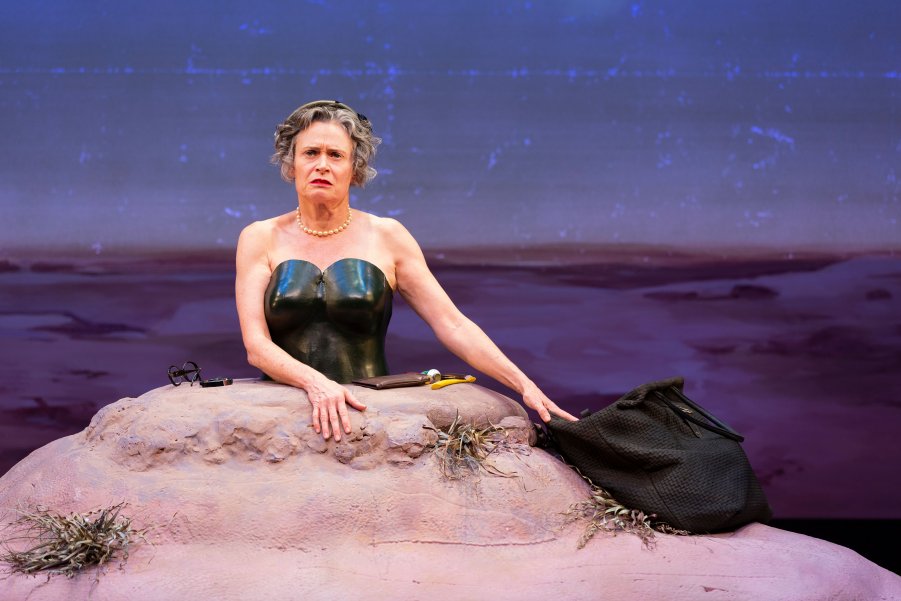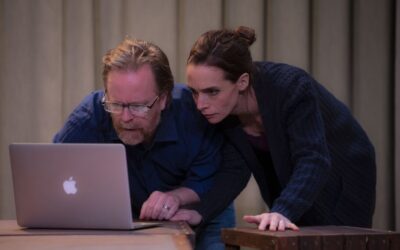By Adam Rafferty
While promoting Happy Days recently, its star, Judith Lucy has been quoted as saying she’s giving up comedy. One could assume that perhaps this is because being cast in the role of Winnie is arguably the apogee of any actresses’ career. Only a small step away from being a monologue – the role of Winnie’s husband Willy (played here by Hayden Spencer) surely one of the most thankless in modern theatre – Winnie is a massive and intricate part for any actor to play, let alone one who’s usually more comfortable pacing about the stage than being buried waist deep in it. But it is exactly that career of comedy experience, that has taught her how to take a line and work all its timing and emphasis to perfection so as to achieve the triumphant performance she does.
Anyone familiar with Samuel Beckett’s work will already know that his plays err on the side of reflective think pieces, rather than ‘sit-back-and-enjoy-the-show’ entertainment. Surreal, dark and sometimes seeming to be devoid of meaning or purpose, the prose in Happy Days is almost best left unanalysed and rather simply ‘received’.
The story opens on Winnie embedded up to the waist in a mound of earth. Eugyeene Teh’s perfectly atmospheric set design giving the impression of rising out of a salt pan in the heart of the outback. A single, hopeless cloud slowly drifting across the painterly landscape projection serving as a backdrop. She’s awoken by a sharply discordant bell and dutifully goes about beginning her daily routine with a prayer and then, by pulling various items from a black bag sat beside her, she brushes of her teeth, drinks the remains of a bottle of tonic and puts on a hat entirely ineffectual at protecting her from the sun’s blazing rays.
All the while she chatters away to herself with boundless positivity and the regular proclamation of “Oh this is a happy day”, although it’s difficult to tell if this is a sincere or ironic suggestion on her part. She eventually awakens Willy who emerges from the rear of the mound, bare backside first, and proceeds to talk to the back of his head, only occasionally receiving acknowledgement, much less meaningful replies. He ties a handkerchief to his bald pate and reads the newspaper, the pair’s Darby and Joan style relationship undercut by the horrific and plainly nightmarish situation they both seem to be in, while not seeming to fight it. This is particularly underlined by the fact Winnie’s bag contains a revolver that is placed on the mound in a manner to taunt those familiar with Chekhov’s work.
Director Petra Kalive has given just the right amount of flexibility to Lucy’s performance, while working within the confines of Beckett’s famously strict rules for pauses within his scripts (even allowing a bit more than eyes to move in the ‘second act’), and the decision to make this a one-act production is a wise move to prevent those who have unexpectedly found themselves in the audience of some ‘serious’ theatre with a potentially misleading title, trotting off bewildered at the interval. But this choice highlights even more how great Lucy’s achievement is here.
Any work by Beckett, especially Happy Days, is not for the faint-hearted, casual attendee of theatre, nor faint-hearted, casual actor. But it’s not overly lofty, high art either. In fact, as already suggested, the less meaning you try to take out of it, the more you may find yourself discovering. But it’s worth knowing that before diving in.
Taking a chance on Judith Lucy in this ‘Hamlet’ of female roles has proven to be no risk at all. Her mastery of the notoriously tricky script and what must be a torturous staging to work within is admirable to say the least. She brings devastating humanity to the character through her ‘keep calm and carry on’ demeanour, while showing flashes of her trademark rapier wit. This brings another layer to Beckett’s work while continuing to leave the expected deep sense of sadness by the show’s undefined conclusion.
This is a modern classic done a little differently, but also just right and is a must-see for theatre aficionados.
Image: Pia Johnson





